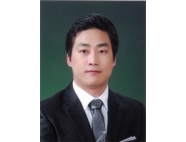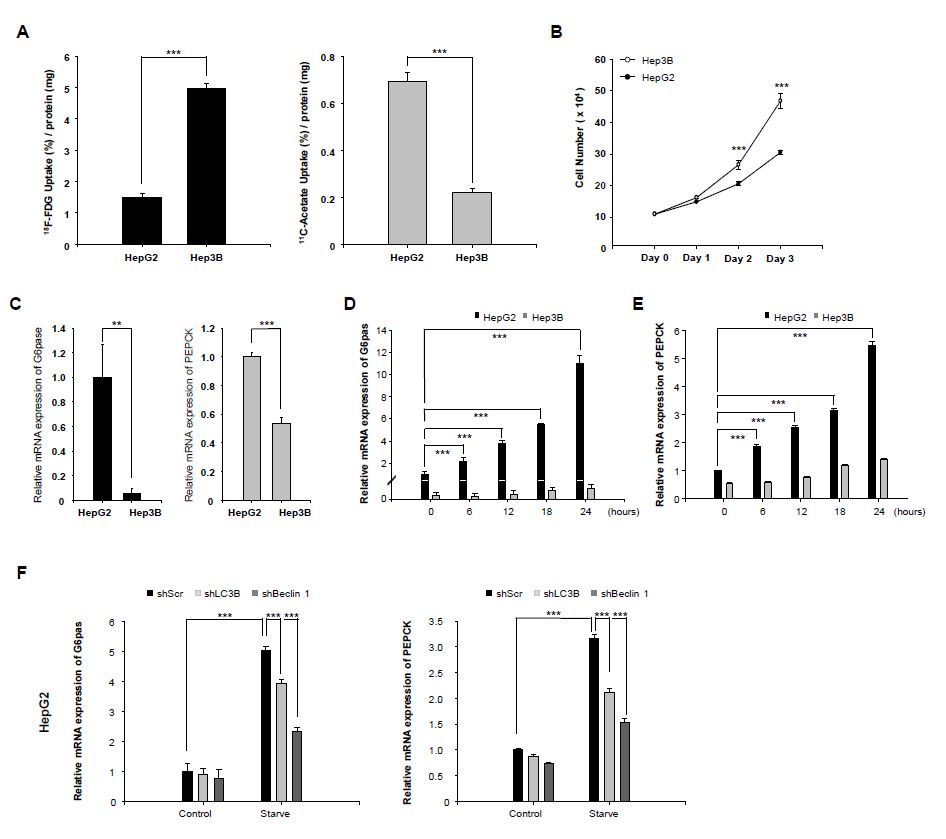글로벌 연구동향
핵의학
 The regulation of glucose-6-phosphatase and phosphoenolpyruvate carboxykinase by autophagy in low-glycolytic hepatocellular carcinoma cells.
The regulation of glucose-6-phosphatase and phosphoenolpyruvate carboxykinase by autophagy in low-glycolytic hepatocellular carcinoma cells.(Harvard Medical School,연세대/전정용,김천기*,윤미진*)
- 출처
- Biochem Biophys Res Commun.
- 등재일
- 2015 Jul 31
- 저널이슈번호
- 463(3):440-6.
- 내용

[Abstract]The glycolytic phenotype is a dominant metabolic phenomenon in cancer and is reflected in becoming aggressive. Certain hepatocellular carcinoma lack increased glycolysis and prefer to uptake acetate than glucose for metabolism. Autophagy plays a role in preserving energies and nutrients when there is limited external nutrient supply and maintains glucose level of blood though supporting gluconeogenesis in the liver. As the role of autophagy and gluconeogenesis in HCC following the glycolic activity was not clear, we cultured HCC cells with different glycolytic levels in Hank's balanced salt solution (HBSS) to induce autophagy and conducted the activity of gluconeogenesis. Both autophagy and gluconeogenesis were induced in low glycolytic HCC cells (HepG2). In glycolytic Hep3B cells, only autophagy without gluconeogenesis was induced upon starvation. When autophagy was blocked, the level of glucose-6-phosphatase (G6Pase) and phosphoenolpyruvate carboxykinase (PEPCK) was reduced in HepG2 cells and not in Hep3B. Altogether, we investigated contribution of hepatic gluconeogenesis to the metabolic phenotype of HCC cells and the role of autophagy as a potential mechanism regulating gluconeogenesis in low glycolytic HCC.
[Author Information]
Jeon JY1, Lee H2, Park J2, Lee M1, Park SW1, Kim JS1, Lee M1, Cho B3, Kim K4, Choi AM5, Kim CK6, Yun M7.
1Department of Nuclear Medicine, Severance Hospital, Yonsei University College of Medicine, 134 Shinchon-dong, Seodaemun-gu, Seoul 120-752, South Korea.
2Department of Clinical Nursing Science, Yonsei University College of Nursing, 134 Shinchon-dong, Seodaemun-gu, Seoul 120-752, South Korea.
3Division of Medical Oncology, Department of Internal Medicine, Severance Hospital, Yonsei University College of Medicine, 134 Shinchon-dong, Seodaemun-gu, Seoul 120-752, South Korea.
4Department of Biochemistry and Molecular Biology, Brain Korea 21 Project for Medical Science, Institute of Genetic Science, Integrated Genomic Research Center for Metabolic Regulation, Yonsei University College of Medicine, 134 Shinchon-dong, Seodaemun-gu, Seoul 120-752, South Korea.
5Joan and Sanford I. Weill Department of Medicine, Weill Cornell Medical College and New York-Presbyterian Hospital, New York, NY, USA.
6Department of Radiology, Brigham and Women's Hospital, Harvard Medical School, Boston, MA 02026, USA. Electronic address: ckkim@bwh.harvard.edu.
7Department of Nuclear Medicine, Severance Hospital, Yonsei University College of Medicine, 134 Shinchon-dong, Seodaemun-gu, Seoul 120-752, South Korea. Electronic address: yunmijin@yuhs.ac.
- 키워드
- Autophagy; Gluconeogenesis; Glycolysis; Hepatocellular carcinoma; Starvation
- 연구소개
- glucose에 의존적인 악성암의 Glycolytic phenotype은 암의 전형적인 대사현상입니다. 본 연구에서는 암세포임에도 low glycolytic phenotype을 보이는 암세포를 찾아내고, 이러한 암세포가 에너지 고갈 환경에서 해당과정보다는 오히려 glucose를 생산하는 gluconoeogenesis 현상이 증가됨을 규명하였습니다. 에너지및 영양분이 모자란 환경에서 일반적인 암세포가 glucose에 더욱 의존적인 경향을 보이는것에 반하는 현상인데, 세포내 에너지및 영양분 공급에 중요한 역할을 하는 autophagy가 이에 주요한 작용을 한다는 것을 밝혀냈습니다. 본 논문의 결과로, 18F-FDG를 이용한 PET 영상에서 확인되지 않는 암에 있어서 발견되지 않는 이유와 원인을 설명하는데 중요한 근거로 사용 될 수 있습니다. Low glycolytic cancer의 특이적 대사활동에 관한 연구를 하시는 분들께 도움이 되리라 생각됩니다.
- 덧글달기
- 이전글 Adenovirus-mediated expression of human sodium-iodide symporter gene permits in vivo tracking of adipose tissue-derived stem cells in a canine myocardial infarction model.
- 다음글 Radiosynthesis and evaluation of 18F-labeled aliphatic phosphonium cations as a myocardial imaging agent for positron emission tomography.









